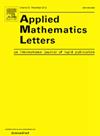具有广义卷积算子的抽象分数阶演化方程的基本解
IF 2.8
2区 数学
Q1 MATHEMATICS, APPLIED
引用次数: 0
摘要
我们研究了一类抽象的分数阶演化方程,该方程由与Sonine核相关的卷积型导数所控制。这些广义导数包含了几个已知的分数算子,包括Caputo-Dzhrbashyan和分布阶导数。我们分析了柯西问题∂t(k∗(u−u0))(t)= - a αu(t),其中k是Sonine核,a是生成有界解析半群的闭线性算子,α∈(0,1)。利用泛函解析技术和隶属理论,建立了无限光滑向量空间的适定性,并利用拉普拉斯变换和分数阶半群理论推导了其解的显式表示。讨论了不同函数空间上的拉普拉斯算子的几个例子来说明这一理论。本文章由计算机程序翻译,如有差异,请以英文原文为准。
Fundamental solutions for abstract fractional evolution equations with generalized convolution operators
We investigate a class of abstract fractional evolution equations governed by convolution-type derivatives associated with Sonine kernels. These generalized derivatives encompass several known fractional operators, including the Caputo–Dzhrbashyan and distributed-order derivatives. We analyze the Cauchy problem where is a Sonine kernel, is a closed linear operator generating a bounded analytic semigroup, and . Using functional analytic techniques and subordination theory, we establish well-posedness in the space of infinitely smooth vectors and derive explicit representations for the solution via Laplace transforms and fractional semigroup theory. Several examples involving the Laplacian on different function spaces are discussed to illustrate the theory.
求助全文
通过发布文献求助,成功后即可免费获取论文全文。
去求助
来源期刊

Applied Mathematics Letters
数学-应用数学
CiteScore
7.70
自引率
5.40%
发文量
347
审稿时长
10 days
期刊介绍:
The purpose of Applied Mathematics Letters is to provide a means of rapid publication for important but brief applied mathematical papers. The brief descriptions of any work involving a novel application or utilization of mathematics, or a development in the methodology of applied mathematics is a potential contribution for this journal. This journal''s focus is on applied mathematics topics based on differential equations and linear algebra. Priority will be given to submissions that are likely to appeal to a wide audience.
 求助内容:
求助内容: 应助结果提醒方式:
应助结果提醒方式:


